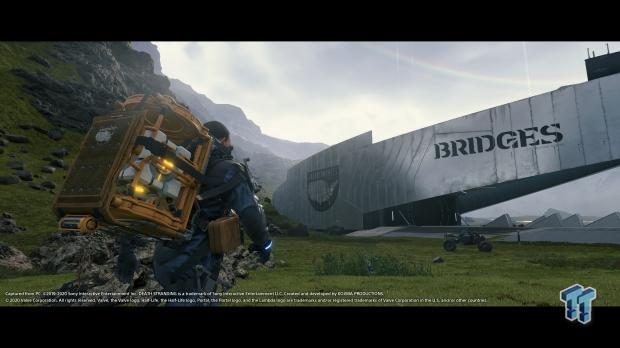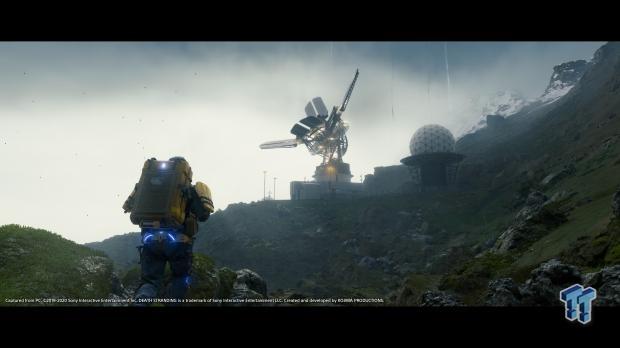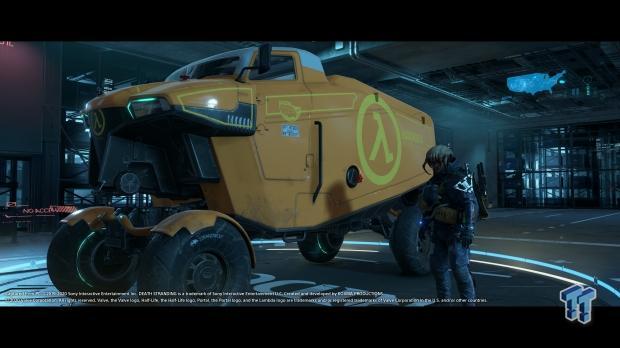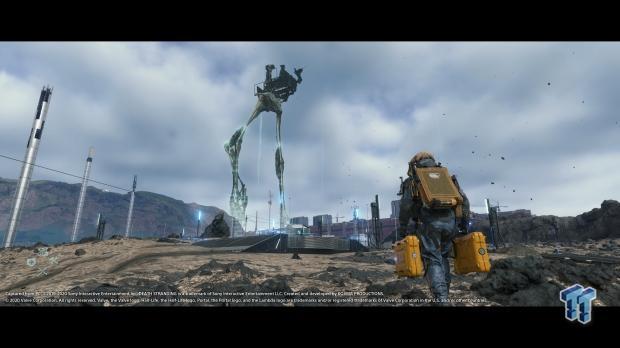Death Stranding PC Review: Phantasmic Voyage
Death Stranding is an exceptionally profound sci-fantasy tale of human connection, hope, and a deep philosophical journey.

The Bottom Line
The Rope and the Stick
- Developer: Kojima Productions
- Release Date: July 14, 2020
- Publisher: 505 Games
- MSRP: $59.99
- Platform: PC (Reviewed on Steam), PS4
- Genre: Open-world action-adventure, Simulator
- Buy Links: Steam, Epic Store
"The Rope and the Stick, together, are one of humankind's oldest tools. The Stick is for keeping evil away; the Rope is for pulling good toward us; these are the first friends the human race invented. Wherever you find humans, the Rope and the Stick also exist." --Kobo Abe
Death Stranding is a weird game. That's something you probably already know, but it bears repeating.
The weirdness permeates the entire game not unlike the inky tendrils of the Beach. Some parts of the game feel like a high-tech fever dream, complete with a brilliant and hyper-realistic HUD and UI that connects to a deep-future alternate reality that's full of sci-fi splendor. Other parts of the game feel like a monotonous test of patience. Then there's the cinematic, movie-like storyline that's just...well...it's out of this world.
In this review, I'll do my best to underline what Death Stranding is and what it isn't, and whether or not you should buy it based on that info.
What it is - Captivating story-driven open-world action game with tedious, long-winded traversal with strong emphasis on resource and inventory management. Will punish you harshly for mistakes. Menus, UIs, and general in-game toolsets are absolutely incredible. Has the most unique kind of multiplayer in the entire industry.
What it isn't - It's not the next Metal Gear Solid game. Action takes a backseat to a more introspective journey that's deeply personal, intimate, and extremely lonely. Don't expect over-the-top action or explosive sequences.
Hideo Kojima's latest project has a bizarre, extremely alluring story arc with the perfect amount of mystery. It's a tale of a world fractured by life and death, a philosophical dive into a deep sea of symbolism and metaphors, and an examination of human behavior amid strife, suffering, and the burgeoning weight of survival.
But the game is also a tedious walking simulator. There's lots of resource management, lots of experimentation, and the daunting feeling that Amazon workers face when the conveyor belts simply won't stop belting out packages.
Even in this tedium, though, the game has a kind of strange pull, a kind of magnetism that makes you want to trek across a ruined inter-dimensional United States just to deliver someone their favorite hat.
More than anything, though, Death Stranding is a profound game that has something important to say.
Its attraction is sometimes hard to define, kind of like a bright light diffused by fog. It's a hallowed, deeply intimate and lonely experience that's punctuated by a sense of camaraderie unlike any other game on the market. In Death Stranding, you're haunted by two types of ghosts: The benevolent ghosts of other players who are always looking out for you, and the fearsome BT shades that want to tear you to the underworld.
To survive, you have to use ropes to bind yourself to others.

We're in this together: The magic of Death Stranding
Death Stranding is built around union, bonds, and hope. It's a tale that uses the symbolism of a wayfaring traveler who delivers hope to those mired in shadows. Those aren't just parcels Sam is delivering. He's delivering hope, and the game's like-based ratings system is a tangible manifestation of that growing connection.
Death Stranding has an extremely unconventional online multiplayer. Rather than teaming up with players and tackling objectives, your interactions with other players are indirect.
There's an indirect communal focus to multiplayer called the Social Strand System that allows players to share items and pepper gifts all throughout the world. Once someone picks up your gift, you get a kind of in-game karma. The karma helps you grow and incentivizes you to keep helping others for extrinsic rewards. But soon, the rewards become intrinsic, and you get into the spirit of giving because you actually want to.
The game is predicated on a kind of altruism and connection that's necessary when humanity is facing significant strife. It's a testament to our goodwill and our heart, the valor, and honor within all of us.

It's a tale of sacrifice--Sam is a literal beast of burden who gives up his body, his time, his mind, and risks everything for the job. The most important job. With monsters haunting every corner of the world, humanity is hunted prey. Those that brave the wilds and the darkness aren't just couriers, but heroes.
There's a distinct Twilight Zone-level morality to Death Stranding. Gamers are encouraged to bind themselves to people they've never met because they share common strife.
Leave a pair of shoes in the public locker because you know what it's like to be out in the wild and have your shoes completely disintegrate. Set down a perfect ladder to help someone else cross the precipice that you spent 10 minutes negotiating. Make a rope anchor so a stranger can easily escape a dangerous area that you died in before.
Death Stranding inspires you to learn from your mistakes, but more importantly, it inspires you to help others avoid those mistakes. It makes you want to help others. It makes you want to become a better player through progress, but part of that learning is innately taught through a moral code that's not enforced, but naturally encouraged.
You want to help others because you know how hard your journey was. You can relate to others that you've never spoken to, never met. This, to me, is the magic of Death Stranding.
Hideo Kojima has found a way to make everyone share a kind of universal pain, and through that pain comes empathy, understanding, and the ultimate desire to lessen the pain. It's a stark metaphor for real life and comes with staggering implications. In Death Stranding, you want to pay it forward at every turn because, quite simply, when everyone else does well, you do too.

This kind of symbiosis is typically rare in video games.
In Death Stranding, you're not competing against anyone, but working with them. Everyone is on your team. There are thousands of other Sams out there doing exactly what you're doing, following in your footsteps, leaving behind tools and resources like compassionate poltergeists you can't see or necessarily hear, but you can feel their presence all the same.
Death Stranding is something that I think Rod Serling would be proud of.
The message might be muddled by tedious game mechanics, strange characters, and odd twists and sequences, but if you look hard enough--and feel hard enough--you can hear the message across the universal frequency that's broadcast in all of our hearts.
Death Stranding has an undercurrent of humanism that's felt every time you see a sign, every time you see a bike someone selflessly left for you, every time one of your packages is delivered for you by proxy.
Hideo Kojima said it best in an interview with GameInformer:
"But today's games, you're playing by yourself in your room alone usually. Then suddenly, you open to a world like, "Oh, I'm not the only one." And I'm really happy a lot of people understood that, and I think that was the most successful part. Of course, you can't see other people's faces, but you can see the tracks and traces, so you can feel or think about the other people."
Mechanics: Not a walking simulator, but a journey simulator
A big part of Death Stranding is figuring things out.
All games have a learning curve, but Death Stranding has more of a learning cliff. Unless you consult guides (which I did), you're going to make mistakes over and over again. The real experience boils down to a kind of time management and the willingness to fail often. The entire game feels like an efficiency simulator where you're trying to get to point A to point B as fast as possible and avoid catastrophe.
There's a lot of strings that are constantly pulling you in multiple directions at the same time, forcing you to stay alert and conscious of your surroundings, your resources, and most of all, your knowledge. The game is built specifically around a sense of voyage and progress, whether it's traversing through a minefield of horrifying Beached Things, climbing up sheer cliff faces, or negotiating the terrain.

The whole time you are not only managing small tedious things like Sam's shoes, his bladder fullness (yes, peeing is part of the game), and keeping your balance on slick surfaces when it rains. Every part of environment traversal is a kind of game in itself. You need to press L2+R2 to brace Sam's balance as you move, or shift your weight left and right with real-time button prompts when carrying ridiculous cargo loads that stretch beyond Sam's head.
The world is your biggest enemy. But it's also your most cherished friend. It bestows upon you some of the most beautiful expanses and vistas in video games, but then punishes you mercilessly if you slip up--whether it's a wet rock, a rushing river, or a massive precipice, Death Stranding always has something waiting to test your mettle.
You have to pay attention to everything from weight to condition of the cargo, which gets damaged from the Timefall rain and any collisions, falls, or general mishaps, and the actual world around you. Sam has to constantly cross wide rivers that threaten to sweep him away, climb steep rocky cliffs, and keep a lookout for troublesome MULEs, or in-game enemies who are literally addicted to stealing cargo.
The result is a love-hate relationship that's oddly attractive. There's something cathartic about Death Stranding's exploration. You actually feel like you're on a grand voyage, one that's full of danger, mystery, and hardship, a voyage where success is based on equal parts skill and luck.
On paper, the prospect of a walking simulator based around delivering boxes from point A to point B doesn't sound very grand or appealing. But its the execution of this idea where Death Stranding shines.
It's not a walking simulator, but more so a kind of journey simulator.
Kojima and his team have found innovative and unique ways to keep things fresh and ensure every delivery is a little bit different than before simply because you are a little bit different than before.
You learn from every voyage, grow from every journey, become more skilled and learned the more you play. There's a strong sense of progression and accomplishment that bleeds into everything you do.
The game makes you feel all sorts of emotions on any given delivery: There's the sheer anxiety when you're trying to ride your bike across an extremely narrow ladder that spans a 50-foot crossing, or the nail-biting suspense of negotiating a rock face and you run out of rope slack. There's also the exultation of finally making it to your destination. Every journey makes you feel weary, hardened, and just a little bit tougher and wiser than before.
This is the hallmark of a good interactive experience. You take something away from every single delivery. And sometimes you also leave something behind.
The game is cryptic, though, and seems to leave a lot of key pieces of info out, like being able to offload all cargo by holding Triangle. It's just more for you to discover, more for you to understand, and more for you to pay attention to. It's more curiosity that binds the community together and makes them ask questions.
This kind of mystery actually adds to the experience. Yes, it can be frustrating, but it's also interesting and enamoring when you find out something new.
Worlds within worlds: Kojima's new cinematic sci-horror mythos
The game summons a kind of deep fascination with its mythos, one that's grounded in a spiritualism centered around hope, prosperity, and union. The major themes of Death Stranding are that of synergy and cooperation. You need other players, and they need you.
The world, its characters, and its basic themes are extremely alluring. These things are the main connective tissue that binds gamers to the experience. If you don't like the story, its themes, or the walking simulator-esque aspect, then you probably won't like the game itself simply because these things are intimately wound not unlike knots on a rope.

Death Stranding has Kojima's signature weirdness that's apparent in all Metal Gear games. The story is somewhat easier to follow but nonetheless baffling and strange. It breaks down like this: The world of the living and the dead have merged and have broken reality.
Shadowy monstrosities roam the world, the rain ages you if it lands on you, and one of your best allies is a baby in a tank that you hook up to a future suit. Oh, and you're basically a post-apocalyptic Amazon delivery man.
But you're not just any delivery man. You're the delivery man. You play as Sam Porter Bridges, hailed as the best porter in what's left of the fractured United States. Your mission now is to make the ultimate delivery by tethering the last bastions of humanity together for the United Cities of America.
There's an eclectic cast of characters with striking appearances and bizarre circumstances. Die Hardman, who's basically the general of the United Cities of America, wear's a skull mask while calmly giving you orders. Amelie is basically like kind of siren ghost that leads you along the way as a hologrammatic projection. Deadman, so named for his previous job as a coroner, is obsessed with BBs and the Death Stranding phenomenon. Heartman dies every 21 minutes and has to be resurrected. Mads Mikkelsen also makes a beautiful appearance, but he must remain mysterious for the sake of the story.
There's a lot more to the story that we can't really go into, but trust me, if you like strange and unusual things, if you like horror movies that make you think, and if you like experiences that have the power to fundamentally change your perceptions, then play Death Stranding for its story.
PC performance and optimization
I'm glad to say that Kojima Productions has made a very competent PC port with Death Stranding.
I only had a few hiccups while playing on an older WD Blue 3TB 5400RPM hard-drive. These were quickly alleviated once I jumped to an SSD. On an HDD, I had audio issues where speaking parts would cut out and were delayed, and some animations were glitched out. Other than that, I haven't had any actual issues while playing the game.
The PC optimizations are well done, and the game features a number of graphics and visual settings like NVIDIA DLSS, which uses AI to super-sample graphics (Death Stranding looks amazing with DLSS enabled) and AMD's FidelityFX Contrast and Adaptive Sharpening functionality which sharpens in-game visuals. In my experience, the FidelityFX didn't exactly help certain parts of the game--namely the environments like grassy fields--but it's still fun to experiment with.
DLSS is where Death Stranding really shines. If you have an RTX card, be sure to play Death Stranding with DLSS on. The game has two DLSS settings: Performance, which focuses on frame rates, and Quality, which puts more emphasis on visuals. I didn't really notice a huge difference in visual quality between the two settings when I played.
With DLSS on and everything cranked up to max settings at 2560x1440 resolution, the game used roughly 4.2GB of VRAM. That's good news for gamers who have 4-6GB VRAM cards.
As for basic performance, Death Stranding ran at solid 1440p 100 FPS with an RTX 2080 SUPER, AMD Ryzen 3700X, and an Acer XG270HU 1440p monitor. I rarely got below 100 frames-per-second with V-Sync on, FPS capped at 144 to match my monitor's refresh rate. Playing at 1440p at Very High presets with DLSS Quality enabled and 140FPS cap pushed temps as high as 70C, but they soon regulated at roughly 63-65C.
Death Stranding PC settings:
- V-Sync toggle
- Max frame rate adjustments
- 21:9 ultra-wide support
- Ambient Occlusion toggle
- Scree Space Reflections toggle
- NVIDIA DLSS post-processing
- AMD FidelityFX Contrast and Sharpness
- Anti-aliasing toggle
- Depth of Field toggle
- Motion blur toggle
- Sharpness slider
The game also features full native mouse and keyboard support that's surprisingly well implemented, but driving vehicles is still pretty wonky. Basic traversal and menu navigation is pretty good with M&KB though, so you could switch back and forth. I still get anxiety when hopping on a rope or crossing a ladder with M&KB.
PC System Tech Specs:
- CPU: AMD Ryzen 3700X
- GPU: NVIDIA GeForce RTX 2080 SUPER
- RAM: 32GB (2x16GB) Corsair Vengeance LPX DDR4-2666MHz
- Storage: ADATA XPG SX950 480GB SSD
- Monitor: Acer XG270HU WQHD AMD FREESYNC (2560 x 1440) Widescreen Monitor
- OS: Windows 10
- PSU: Thermaltake Smart M 850W Semi-Modular Power Supply
- Case: Cooler Master MasterCase H500 ARGB
Death Stranding PC Requirements
Minimum (720p 30FPS)
- OS: Windows 10
- CPU: Intel Core i5-3470 or AMD Ryzen 3 1200
- RAM: 8GB
- GPU: GeForce GTX 1050 3GB or AMD Radeon RX 560 4GB
- API: DirectX 12
- HDD: 80GB
- Sound card: DirectX compatible
Recommended (1080p 30FPS)
- OS: Windows 10
- CPU: Intel Core i5-4460 or AMD Ryzen 5 1400
- RAM: 8GB
- GPU: GeForce GTX 1050 Ti 4GB or Radeon RX 570 4GB
- API: DirectX 12
- HDD: 80GB
- Sound card: DirectX compatible
Recommended (1080p 60FPS)
- OS: Windows 10
- CPU: Intel Core i7-3770 or AMD Ryzen 5 1600
- RAM: 8GB
- GPU: GeForce GTX 1060 6GB or AMD Radeon RX 590
- API: DirectX 12
- HDD: 80GB
- Sound card: DirectX compatible
Final Thoughts: Here there be phantoms
Death Stranding isn't for everyone. It's an acquired taste. Kojima's latest game won't deliver over-the-top action, nor is it the infinitely replayable live service multiplayer game that gets tons of updates. It sits by itself on its own shelf. The game is a slow burn, the type of experience you play to kill time or just zone out to, an introspective cinematic simulator that's cathartic in a strange way.
There's something enjoyable about plotting out voyages, managing resources, and exploring the beautiful--yet haunted--in-game world. If you like No Man's Sky, I think you'll like this one. The two are very similar and are focused around getting lost, trying your hardest to plot out courses, and managing your time--and abilities--wisely.
Death Stranding is the type of game you play on a rainy day. It's the type of game you play in isolation to forget the world and connect with a bunch of strangers you've never met before. It's a kind of universal simulator broadcast on a frequency we can all hear with our minds and hearts, but it can be a tedious adventure into frustration and annoyance at times.
Still, though, I believe this is something everyone should try out.
What's Hot
+ The best UI and map system in gaming
+ Profound symbolic and metaphorical story beats and gameplay creates an intimate, engaging, and emotional experience
+ Unique world full of strange and alluring characters
+ Beautiful worldbuilding and sci-fi elements
+ Unlike anything on the market today and puts strong emphasis on union, bonds, and connections with other players
+ The soundtrack is immaculate
+ Strong PC-level optimizations including NVIDIA DLSS for boosted performance
+ Incredible motion capture
+ BB is the best boy and we don't deserve him
What's Not
- Tedious gameplay can get rote and tiresome
- Inventory management is a big part of the experience
- Learning by failure can be frustrating
PC Performance | 90% |
Storyline | 95% |
Game Mechanics | 85% |
Visuals and Graphics | 95% |
Overall | 91% |
The Bottom Line
Death Stranding isn't for everyone, and can be quite tedious. But it's also one of the most unique and meaningful games of the generation.

Similar Content
Related Tags
![Intel shelves Raja Koduri, out of the GPU unit, back to Chief Architect position Intel shelves Raja Koduri, out of the GPU unit, back to Chief Architect position]() Intel shelves Raja Koduri, out of the GPU unit, back to Chief Architect position
Intel shelves Raja Koduri, out of the GPU unit, back to Chief Architect position![Atari hardware revenues down 91% as VCS console significantly underperforms Atari hardware revenues down 91% as VCS console significantly underperforms]() Atari hardware revenues down 91% as VCS console significantly underperforms
Atari hardware revenues down 91% as VCS console significantly underperforms![NVIDIA's purported next-gen TITAN RTX renders: quad-slot GPU, dual 16-pin power NVIDIA's purported next-gen TITAN RTX renders: quad-slot GPU, dual 16-pin power]() NVIDIA's purported next-gen TITAN RTX renders: quad-slot GPU, dual 16-pin power
NVIDIA's purported next-gen TITAN RTX renders: quad-slot GPU, dual 16-pin power![PlayStation's Jim Ryan isn't worried about Xbox Game Pass, but he should be PlayStation's Jim Ryan isn't worried about Xbox Game Pass, but he should be]() PlayStation's Jim Ryan isn't worried about Xbox Game Pass, but he should be
PlayStation's Jim Ryan isn't worried about Xbox Game Pass, but he should be![Final Fantasy 16 will flex the PlayStation 5's power, Yoshi-P says Final Fantasy 16 will flex the PlayStation 5's power, Yoshi-P says]() Final Fantasy 16 will flex the PlayStation 5's power, Yoshi-P says
Final Fantasy 16 will flex the PlayStation 5's power, Yoshi-P says
![TeamGroup T-Create Classic DL 1TB SSD Review - Stalwart DRAMless TeamGroup T-Create Classic DL 1TB SSD Review - Stalwart DRAMless]() TeamGroup T-Create Classic DL 1TB SSD Review - Stalwart DRAMless
TeamGroup T-Create Classic DL 1TB SSD Review - Stalwart DRAMless![Acer Predator GM7000 4TB SSD Review - 4TB of Elite Performance Acer Predator GM7000 4TB SSD Review - 4TB of Elite Performance]() Acer Predator GM7000 4TB SSD Review - 4TB of Elite Performance
Acer Predator GM7000 4TB SSD Review - 4TB of Elite Performance![Cooler Master XG850 Plus Platinum PSU Review Cooler Master XG850 Plus Platinum PSU Review]() Cooler Master XG850 Plus Platinum PSU Review
Cooler Master XG850 Plus Platinum PSU Review![SteelSeries Apex 9 Mini Gaming Keyboard Review SteelSeries Apex 9 Mini Gaming Keyboard Review]() SteelSeries Apex 9 Mini Gaming Keyboard Review
SteelSeries Apex 9 Mini Gaming Keyboard Review![PCCooler GAMEICE CPU Air Coolers (K4, K6, and G6) Review PCCooler GAMEICE CPU Air Coolers (K4, K6, and G6) Review]() PCCooler GAMEICE CPU Air Coolers (K4, K6, and G6) Review
PCCooler GAMEICE CPU Air Coolers (K4, K6, and G6) Review
![Silicon Motion SM2267XT DRAMless Laptop SSD Preview - Speed and Efficiency Silicon Motion SM2267XT DRAMless Laptop SSD Preview - Speed and Efficiency]() Silicon Motion SM2267XT DRAMless Laptop SSD Preview - Speed and Efficiency
Silicon Motion SM2267XT DRAMless Laptop SSD Preview - Speed and Efficiency![NVIDIA GeForce RTX 4080 Unboxed: FE, ASUS, MSI and ZOTAC NVIDIA GeForce RTX 4080 Unboxed: FE, ASUS, MSI and ZOTAC]() NVIDIA GeForce RTX 4080 Unboxed: FE, ASUS, MSI and ZOTAC
NVIDIA GeForce RTX 4080 Unboxed: FE, ASUS, MSI and ZOTAC![NVIDIA GeForce RTX 4090 OC Shootout: ASUS, COLORFUL, FE, MSI, GAINWARD NVIDIA GeForce RTX 4090 OC Shootout: ASUS, COLORFUL, FE, MSI, GAINWARD]() NVIDIA GeForce RTX 4090 OC Shootout: ASUS, COLORFUL, FE, MSI, GAINWARD
NVIDIA GeForce RTX 4090 OC Shootout: ASUS, COLORFUL, FE, MSI, GAINWARD![NVIDIA GeForce RTX 4090 Unboxed: FE, ASUS ROG Strix, MSI SUPRIM LIQUID NVIDIA GeForce RTX 4090 Unboxed: FE, ASUS ROG Strix, MSI SUPRIM LIQUID]() NVIDIA GeForce RTX 4090 Unboxed: FE, ASUS ROG Strix, MSI SUPRIM LIQUID
NVIDIA GeForce RTX 4090 Unboxed: FE, ASUS ROG Strix, MSI SUPRIM LIQUID![Storage Showdown - Intel Alder Lake vs. AMD Zen 4 Storage Showdown - Intel Alder Lake vs. AMD Zen 4]() Storage Showdown - Intel Alder Lake vs. AMD Zen 4
Storage Showdown - Intel Alder Lake vs. AMD Zen 4


